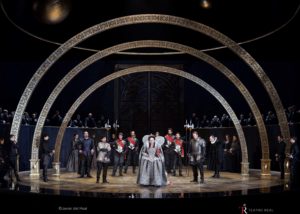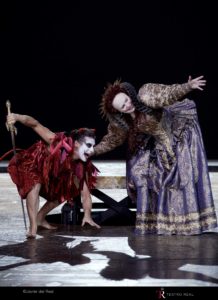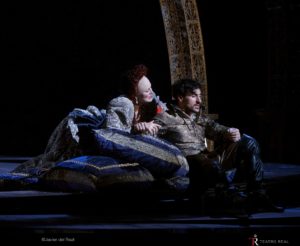The most powerful men in the world – among them King Philip II Habsburg of Spain; Eric Vasa, later king of Sweden; and the archdukes of Austria – Ferdinand I Habsburg and his son Charles of Styria – vied for her hand. She refused them all. The court was abuzz with gossip and her enemies called her ‘the whore of Europe’; meanwhile, Elizabeth I consistently cultivated her status as the Virgin Queen, a woman not subject to any man, thanks to which fact she could rule the country independently. It was more difficult for her to maintain a reputation as a woman immune to flights of feeling. She was always surrounded by favourites, from Robert Dudley, the ‘sweet Robin’ with whom she fell in love back in her childhood, and whose premature decease she mourned so long and painfully that her courtiers had to break down the door to her chamber. She was fascinated by beautiful, intelligent and ambitious men. Increasingly younger with the passing years. In 1587, she received Robert Devereux, Earl of Essex – Dudley’s godson and later stepson – into her group of favourites. Robert was captivatingly handsome… and rotten to the core. He whispered false compliments into the queen’s ear, danced the galliard with her, played cards and chess with her until all hours of the night, in an effort to relax her vigilance and attain a better position in the ruthless battle for power. In 1599, right in the middle of the Irish war against English rule, he convinced Elizabeth to put him at the head of an army of 16 000 and entrust him with the mission of quashing the rebellion. He squandered the campaign and entered into treasonous alliances, but when he realized his error, it was too late. This time, the queen did not forgive him. She divested him of all privileges, and finally sent him under the executioner’s hatchet. She died two years after the decapitation of her last favourite: numb, indifferent to the world, submerged in deep depression.
The tragic story of their relationship – viewed through the prism of Freudian psychoanalysis – was described by Lytton Strachey in his book entitled Elizabeth and Essex. It was this book which became the main source of inspiration for William Plomer, librettist for the opera Gloriana, the greatest failure Britten experienced in his lifetime. Elizabeth II, daughter of George VI, was proclaimed as queen on 7 February 1952. A few weeks later, Britten and Peter Pears went skiing in the company of the Earl of Harewood, at that time director of Covent Garden. Harewood, encouraged by the recent success of Billy Budd, suggested that the composer write an opera in honour of the coronation planned for the next year. Britten threw himself into a frenzy of work. In May 1953, a few weeks before the planned première, the players of the lead roles – Pears as Essex and Joan Cross as Elizabeth – presented selected fragments with piano accompaniment to the royal couple at the Harewoods’ London residence. Already then, the singers sensed an impending catastrophe. Cross was shocked by the complete lack of interest on the part of the audience, hidden beneath the mask of court etiquette. From the beginning, Pears had felt uncomfortable in the role of Robert – so much so that Britten reportedly considered transposing it for a bass voice and engaging Bulgarian singer Boris Christoff. The production was received icily. There was a shower of accusations that the creators had offended the queen even just with their selection of subject matter for the opera. The critics reproved the dramaturgical weaknesses of the libretto, as well as the imitative and pompous character of the music. Gloriana was omitted from the recording of Britten’s complete works conducted by composer. It has returned to the stage sporadically and often in unfortunate circumstances. A chance for it to take its place in the mainstream repertoire was seen only in 2013, on the occasion of Britten’s 100th birthday celebrations and the new staging prepared at the Royal Opera House as part of them.
Gloriana in Madrid, Act I. Photo: Javier del Real.
Sixty years after the world première, most of the charges leveled against the opera appear to be pointless. The supposedly imperfect libretto is astounding in the panache and psychological depth of its characters. The score holds true pearls – the wonderful monologue of the queen torn between feelings and duty, ending with an ardent prayer (‘Forgive and protect me, O God, my king, that I may rule and protect my people in peace’); the brilliant pastiches of court dances in Act II; the heartbreaking duet of the protagonists from Act III, shortly after Essex bursts into Elizabeth’s bedroom and is shocked to discover her shameful old age. The main axis of the drama is designated by the same motif as in Peter Grimes and Billy Budd – a forbidden love whose object must be gotten rid of or destroyed. Except that in this opera, the unfulfillable feeling concerns the queen: the personification of duty to the state and the nation, a providential being whose weakness it was unsuitable to display in the decade of the country’s rise from the ashes of wartime destruction. Gloriana had to wait for its chance. A few days ago, it made its entrance on the stage of the Teatro Real, conquering yet another barrier – the Spaniards’ aversion to the queen responsible for the defeat of the Spanish Armada.
Scottish stage director David McVicar organized the space around a gigantic mobile astrolabe, or more properly, armillary sphere – a device that in this conception appears to symbolize not only the power of the authority wielded by Elizabeth, but also its limitations. The sun never sets on the empire: it circles endlessly over the round map of the world appropriated by the queen and trod by her subjects. It does not set because it is imprisoned in this sphere. The circles of the astrolabe turn about their own axis and emerge in various planes, but the construction holds firmly together. The entire evil – the intrigues, the lies, the treasonous instigations – are born outside and mercilessly infiltrate the depths of the sphere. Robert Jones’ stage design is complemented by Brigitte Reiffenstuel’s costumes, clearly inspired by the portrait painting of the period, and above all, by the masterful light design (Adam Silverman), highlighting not so much the splendour as the thickening gloom of the final years of Queen Gloriana’s reign. McVicar played out his stage gesture with typically British solicitude, having found a very intelligent ally in the person of Colm Seery (choreography), who did his thing in the court masque and ball scenes. The singers did an excellent job with their acting tasks, and chief among them Anna Caterina Antonacci (Elizabeth), who moved about the stage with a stiffness characteristic of a sickly woman crushed beneath the weight of age.
Anna Caterina Antonacci (Elizabeth). Photo: Javier del Real.
Antonacci’s voice took on full expression only at the end of Act I; however, her colourful, beautifully-aging soprano was an ideal match for the role assigned to it by Britten. I was somewhat less convinced by Leonardo Capalbo in the role of Robert Devereux, who possesses a tenor of not particularly memorable sound, at times over-vibrated and not too secure in intonation. In the duet from Act III, however, both of them rose to the heights of interpretation, carrying on their dialogue in two different shades of despair – Essex’s laden with desperate fear; and the queen’s, with painful resignation. Wonderful supporting characters were created by Duncan Rock (Mountjoy), Leigh Melrose (Robert Cecil), Paula Murrihy (Frances), and especially Sophie Bevan (Penelope), whose terrifying scream after the queen signs the sentence upon Essex rings in my ears to this day. Deserving of separate mention is Sam Furness in the small role of the Spirit of the Masque – sung in a tenor bringing to mind associations with the first person to play this role, William McAlpine. A year ago on this stage, Furness portrayed the role of the Novice from Billy Budd, another character created by McAlpine. Every time I hear him, I have an impression of continuity in a beautiful vocal tradition, carried on by a singer intelligent enough to resist current fashions.
Anna Caterina Antonacci and Leonardo Capalbo (Robert Devereux). Photo: Javier del Real.
The true revelation of the Madrid première, however, turned out to be the conductor. Ivor Bolton led Gloriana completely differently from his few predecessors. Instead of highlighting the ‘Elgarisms’ contained in the score, of underlining its pathos and sharp rhythmic contours – he delved into the depths of Britten’s inspirations. And then, it suddenly turned out that all those madrigals, anthems and lute songs are there for a reason. That Britten’s composition is not a spectacular medley of pseudo-Elizabethan melodies, but rather a deeply thought-out, sometimes ironic, sometimes melancholic, every now and then brutally blunt pastiche. In the pavane played in this way, one heard a foreshadowing of the impending tragedy. In Elizabeth’s prayer presented in this way, the desire for a peaceful reign clashed with the spectre of a painful past. All the more forcefully that Bolton had under his baton alert, sensitive musicians who reacted to every nod of his head.
The ovation after the première was surprisingly restrained. Two days later – now in Warsaw – I heard a broadcast of the third showing, received considerably more warmly by the audience. The ‘slighted child’, as Britten himself called Gloriana, is slowly emerging from oblivion. Let’s hope no one scares it away again.
Translated by: Karol Thornton-Remiszewski



